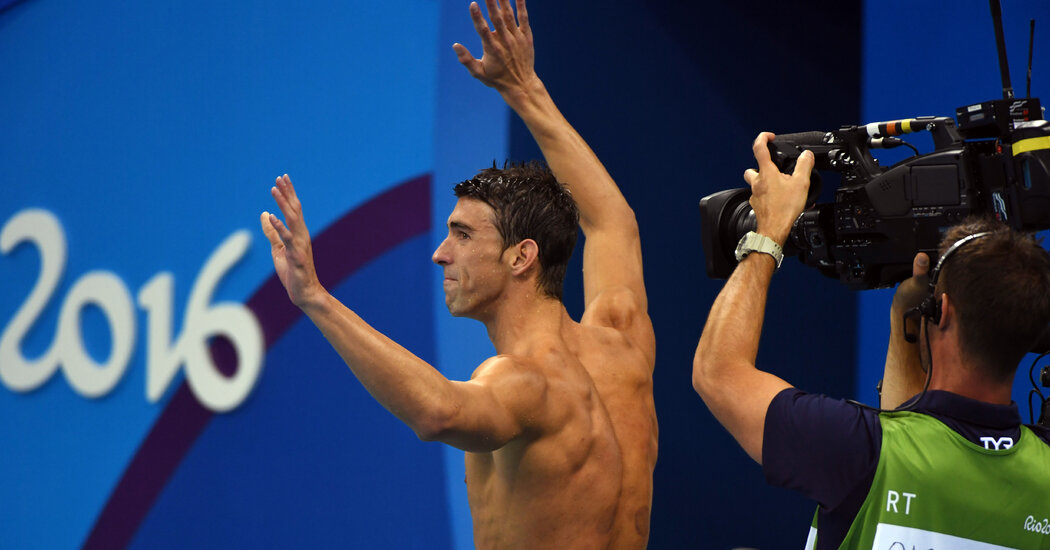The relationship between the United States Olympic and Paralympic Committee and its most decorated Olympian, Michael Phelps, has been rocky for years.
The more Phelps won, and did he ever win, racking up 28 Olympic medals across five Games, the more he became the organization’s poster child, worthy of whatever special treatment it could provide. Or, from Phelps’s perspective, he was the latest and greatest commodity that Olympics promoters cared about only as a medal-producing swimming machine.
Phelps distills that dynamic near the end of “The Weight of Gold,” the HBO Sports documentary he narrates about depression and other mental illnesses with which Olympians struggle. Phelps is also an executive producer of the film, which was set to have its premiere on Wednesday night.
“I can honestly say, looking back on my career, I don’t think anybody really cared to help us,” he says, staring blankly at an offscreen interviewer. “I don’t think anyone jumped in to ask us if we were OK. As long as we were performing, I don’t think anything else really mattered.”
But that uneven treatment and response to the film, Phelps said in an interview this week, illustrates how Olympic officials and coaches view athletes as valuable assets during their brief windows of Olympic glory, but then leave them largely on their own during the years between Games. And when their careers are interrupted or over, the system moves on to the next star.
“I feel like they don’t care about anything I do right now,” Phelps, 35, said of the United States Olympic and Paralympic Committee.
In recent months, the committee, which says it has always welcomed and wanted Phelps’s input, has formed a mental health task force to help change and expand a system that its chief executive, Sarah Hirshland, has made clear needs to be updated. The organization takes roughly 1,000 athletes combined to the Winter and Summer Olympics during each four-year cycle but has just three mental health officers on its staff.
“There is room for us to grow and improve,” said Bahati VanPelt, who became chief of athlete services for the U.S.O.P.C. last year. “I am a big believer in a framework that is holistic and available throughout the entire life cycle of an athlete’s career.”
The crux of the problem, Phelps and other athletes say, is that for several years Olympic officials and elite athletes have had two very different definitions of athlete support.
To the Olympic committee, athlete support has largely meant providing services — state-of-the-art training facilities, top coaches and sports scientists, access to sports psychologists, plus a lot of Team U.S.A. swag — that seemingly led directly to bringing home medals.
To athletes, support should have evolved by now into something more holistic that included caring for their mental health in ways beyond the sports psychologists who focused on priming their minds for competition.
“We have to educate people that mental health is not a weakness,” said Katie Uhlaender, a four-time Olympian in skeleton who is among the athletes profiled in the film. Others include Steven Holcomb, a gold medalist in bobsled who died in 2017; the figure skaters Sasha Cohen and Gracie Gold, and Jeret Peterson, an aerial skier who killed himself in 2011. “It’s a matter of having people come at this from the perspective of performing versus healing,” she said.
Uhlaender and others say there is a dire need for athletes to have easier access to therapy that does not involve going through the coaches and high performance staff — people who each year evaluate their fitness for competition and membership on the national team and who might penalize an athlete they know has needed help dealing with mental illness.
The U.S.O.P.C. has tried to move in this direction. A growing number of athletes have access to unlimited phone counseling and six in-person therapy sessions with a licensed professional through the employee assistance company ComPsych. The benefit was extended this year to some 4,400 athletes, more than three times the number that had access to it before the coronavirus pandemic caused the postponement of the Tokyo Games to 2021.
The committee is also building a registry of mental health professionals whom athletes will be able to consult without approval from anyone at the U.S.O.P.C., though who qualifies and pays for that benefit is still being worked out.
Already this year, Kelly Catlin, an Olympic cyclist, and Pavle Jovanovic, a former Olympic bobsledder, have killed themselves.
“I can’t see any more suicides,” Phelps said.
Phelps said he discovered the value of therapy in 2014, during the first months of his comeback attempt ahead of the 2016 Olympics, when he was caught speeding and driving while intoxicated in a tunnel in Baltimore. He said he views the incident, and the suicidal thoughts he had afterward, as the culmination of years of “stuffing down” his feelings of emptiness, vulnerability and a lack of confidence about anything other than winning races.
The opportunity to make “The Weight of Gold” arose in 2017 when its director, Brett Rapkin, approached Peter Carlisle, Phelps’s agent, about the project as Phelps was becoming more vocal about mental health. Rapkin had been working on a film about Holcomb, the bobsledder who struggled with depression and spoke openly about his suicidal thoughts. Rapkin last interviewed Holcomb in the spring of 2017, just days before Holcomb died alone at the Olympic Training Center in Lake Placid, N.Y., of an overdose of sleeping pills and alcohol.
“The metaphor I like to use is when it comes to the spectrum of sports performance, we think the top is hitting a grand slam to win the game and the bottom is striking out, when in fact the actual bottom is not wanting to be alive,” Rapkin said.
The filmmakers approached U.S.O.P.C. officials about participating in the film and providing footage. The organization said it would only do so at a cost of roughly $100,000 — a discount of its standard licensing fee. It also wanted the film to highlight the health services it provides, services that Phelps and other subjects in the film deemed wanting.
That was not the film Phelps, Carlisle and Rapkin wanted to make. The result only has athletes on camera talking about their struggles.
“I knew it was going to be emotional and raw,” Phelps said. “It’s the real emotions we lived with our whole career.”

















